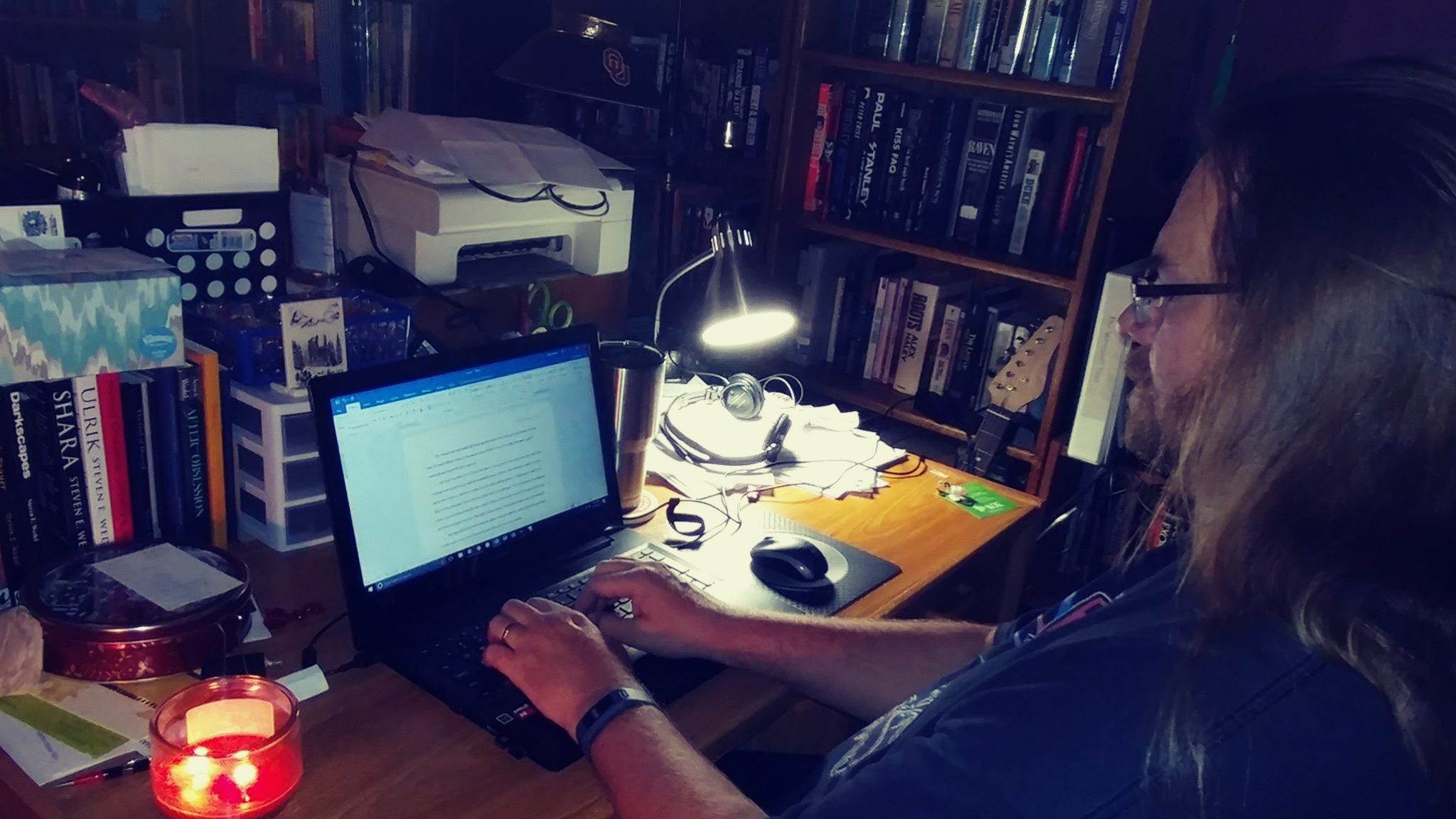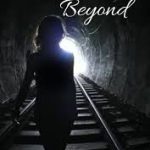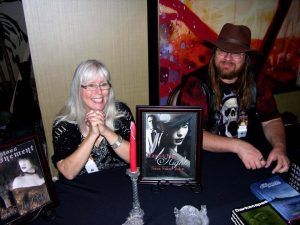One simply can’t – and damn well shouldn’t – discuss top-ranking horror writers, particularly in the world of small press, and not mention Steven E. Wedel. An inner city school teacher by day, a terror of plot and charactors by night, Steve’s breakout series, The Werewolf Saga, all but re-engineered an entire sub-genre. His stand-alone books such as Amara’s Prayer, Seven Days In Benevelence, Little Graveyard On The Prairie and more demonstrate the ease at which Steve seems capable of entwining his readers into worlds in which everything is up for fear and contemplation. Steve is one of those rare writers who moves with ease between genres. Whether it’s straight ahead horror, western, paranormal, or a whimsical young adult book, Steve creates worlds in which escape from the real world is pure pleasure even when forced to question our own morals as we bare witness to the many, often unsettling, possibilities Steve puts before us as only a master of his craft can.
Steve keeps his style lean, mean, and straight to the heart within several full length novels, multiple short stories, and a handful of novellas, including the one I caught up with him about most recently, A Light Beyond. A Light Beyond is part of a collection of literary works being brought into the world through Steve’s self publishing banner, MoonHowler Press.
Readers of this blog not yet familiar with Steve’s work, be warned: letting this interview be your first step to catching up on Steve’s library of literary creations will likely induce many a sleepless night. Just hope it isn’t during a night while the moon is at its fullest.
A Light Beyond is a bit of a turn from your usual work considering there are no supernatural aspects whatsoever in this one. Did your deviation from the supernatural effect your typical mindset or approach to the writing in any way?
No, not really. I mean, usually the supernatural is just an element of the story. It doesn’t necessarily need to be the main part of the story. Like the werewolf saga for instance. Yes, they’re werewolves, but what they’re actually dealing with is stuff that anybody can relate to, I think. And with the werewolf stuff, a lot of it is metaphorical anyway: Suppressed rage, things we can’t live out in a civilized society. So, for A Light Beyond, to have it not be supernatural really wasn’t that big of a deal for me. It was still this guy dealing with his issues and this time it did not involve ghosts or werewolves or anything like that
How long did A LIGHT BEYOND formulate in your head before you sat down to write it?
Well, I don’t know exactly, but I first wrote the synopsis for it in February 2013, and I sent it to the agent I had at the time and he didn’t want it. He had a very specific thing he wanted me to write and we never did come to an agreement on that. I can definitely trace it back to February of 2013.
One of the things I love about this story is how I was constantly kept on my toes as far as predicting what might take place next. At times, I was sure I had a certain character or event pegged only to find out later how wrong I was. How much of the story and foreshadowing were pre-planned and how much of it was just as much of a surprise to you?
Surprisingly, this one… I usually don’t do a lot of planning, but this one I had an entire little chart made out for each chapter of what what was going to happen in each chapter. It was more so that when I got to the climatic moment where you find out what’s going on I’ll have everything in place before then. I guess because there was more of a mystery element to this one than most of the supernatural horror fiction it did take a lot more planning. The first few chapters I did not have an outline, but once I got maybe a few chapters in I had to outline the rest of the book and then I stuck to it pretty well.
Witnessing Robert’s life, it’s easy to feel this child’s heart-wrenching pain and, later when he’s an adult, to feel the tragic trajectory of his life over the years. Where did you find yourself drawing from to connect us so closely to a character like Robert?
This is the thing that non-writers really just don’t seem to get. I mean, obviously I had not done what it was that Robert did, but I think we’ve all done things in the past that we have some regrets with that we would change if we could go back and do it and that’s where I drew from. There were things that I did when I was a kid or just a younger person that they were not smart things and they might have hurt somebody. It was simply a matter of magnifying and refocusing stuff and then projecting that onto (Robert).
As beaten down of a human being as Robert eventually becomes, it’s hard not see a certain innocence that’s stuck with him since he was a young boy. Without this boyish quality, do you think the outcome for Robert would have been any different, and do you think readers would react any differently to him as a result?
Oh, definitely. With everything that happened to him Robert is a real asshole. That was definitely a path that was open to him, but because of other things that happened, the love her felt for Allia, what we did not see in his parents, that kind of thing. If I could preserve the innocence and had he not had that, I don’t think readers would care about him really at all and, of course, his outcome would have been different. One of the things we see over and over in Robert is he keeps trusting. He’s too open and that’s what ended up leading him down to the subway in the first place.
Regarding your editing process, how did your first draft compare with the final product? Was this typical of most of your stories?
This one actually required less editing than most and I think a good part of that is I didn’t get distracted during the writing. I pretty much wrote very day and got it done. Now, if you go back and look at the original synopsis, there are quite a few differences. In the original synopsis instead of being in the subway, he was in an alley. There were a lot of subtle differences there, but as far as the complete rough draft and what was actually published, the biggest change there would be I went back and forth a lot on the role of the rats in the subway. There were some chapters in the rough draft where there was no rats and then they’d come back. I couldn’t decide do I want them there, how much do I want them doing in there? And then the rough draft ended slightly differently. All of my pre-readers complained about the ending
Well, I love the metaphor and the literal tension the rats gave so I’m glad you kept the rats. Speaking of the final product, you chose to take marketing matters into your own hands and release A LIGHT BEYOND using your own publishing label, Moonhowler Press. What lead to this decision rather than the more traditional method of submitting and waiting for acceptance?
One of the big things is the length. The book is 51,000 words so that’s a long novella, not long enough to be a novel. There’s not too many traditional publishers that would take on something of that size and over the years I’ve been burned so many times by small presses. I’m not saying there’s not some good small presses out there because there are, but my dealings with Publications, Scrybe Press, even Double Dragon Publishing who never really did me any wrong they just did not do any promotion whatsoever. A few others they would accept a book then go out of business or I’d never get paid, things like that. With the ease of self publishing and being hands-on in various channels and the knowledge I have in layout and design and editing from journalism and English and all the things I’ve done over my life,, I decided to do just it myself. I started my own press, mostly to do promotional stuff back in 2001 and, six or seven years ago maybe, I started republishing stuff that I got back from these failed publishers and started doing it myself. Doing it myself allows me to track sales. I always know how much money is due, how many copies are sold, what promotional things I’ve done that have worked, what didn’t work. I harp on Scrybe Press a lot because they’ve done of a lot of my books. I mean, I never knew what worked, I wouldn’t get a statement, I wouldn’t get any money, so it’s just easier this way.
As far as my next question goes you kind of answered a little bit of it, but what unique challenges and/or freedoms does publishing on your own have for you?
The number one freedom is easy, you get pretty much all the money. Even though…. and all that. The challenge is, especially for me because I am an introverted person is just marketing my own work. I have a problem putting my book in somebody’s hand and saying here, I think this is good, you should buy it, give me money.
Always the humble man, but at the end of the day, right? With that said, now that you’re going forward with Moonhowler Press do you think you will ever look back at traditional publishing again?
Oh, yeah. I’ve got a book coming out next fall co-authored with Carrie Jones. It’s going to be from Tor Publishing. So, you know, they’re a pretty big deal (chuckles). That’s actually part of a series so we’re hoping that will take off, and I’ve written solo (another) adult novel with Carrie with some supernatural stuff. I’ve written a solo young adult novel that I’m hoping Tor will take a look at. They keep promising they will as this book keeps moving down the editing process.
I have another book called The Teacher which is loosely based on things I have witnessed as a teacher with, you know, a story wrapped around it and I would like to find a traditional literal publisher for that, but I don’t know. The thing with today is you send something out and if they’re not interested they don’t even respond at all. It’s so hard to break in. A friend of mine, Harvey Steinborough, he’s completely done with traditional publishing. He doesn’t even try. He writes stuff and publishes it. He publishes several books a year and he does pretty well at it. Eventually I might give up on it altogether and just do it myself.
Assuming things go well and the plan comes together with the added exposure you’re getting through Tor Press and hopefully having your own press really opens things up for you, what’s next for your writing and Moonhowler Press?
Well, with Moonhowler Press I’m a little interested in branching out and publishing other people, but I’m just not ready for that right now. That would involve a whole lot more bookkeeping than I’m ready to do. I don’t want to be the next publisher who’s not paying, and with me it’s not that It would be that I don’t pay them, I would just get behind on other stuff and I don’t want to do that, but I would like to expand and publisher other people. I have some friends who have also had bad book deals and they got all their right back and they need their books out there again.
As to myself, probably the next book that I will release and it will be through Moonhowler Press is kind of a return to my werewolf story. However, it’s a little different. It doesn’t involve characters that yu already know from the book. This goes back to the viking age and is really built into my early page of my werewolf anthology. So, it’s a little different.
Very cool. I’m very much looking for to both of those projects. All the best with MoonHowler Press as well. It’s exciting that you have another avenue for your work especially with all the shortcomings and hurdles you’ve had to deal with from some small presses so I wish you the best of luck. Thanks so much for this interview, Steve. I know you’re fighting a cold so I appreciate you putting yourself out there for us. Anything else you might like to add before we wrap up?
I appreciate you giving me the opportunity to do this interview and all the promotion you’ve done for me over the years.
Always my pleasure, Steve. Thank you!












